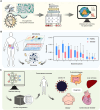Microbial Technologies Enhanced by Artificial Intelligence for Healthcare Applications
- PMID: 40100535
- PMCID: PMC11917392
- DOI: 10.1111/1751-7915.70131
Microbial Technologies Enhanced by Artificial Intelligence for Healthcare Applications
Abstract
The combination of artificial intelligence (AI) with microbial technology marks the start of a major transformation, improving applications throughout biotechnology, especially in healthcare. With the capability of AI to process vast amounts of biological big data, advanced microbial technology allows for a comprehensive understanding of complex biological systems, advancing disease diagnosis, treatment and the development of microbial therapeutics. This mini review explores the impact of AI-integrated microbial technologies in healthcare, highlighting advancements in microbial biomarker-based diagnosis, the development of microbial therapeutics and the microbial production of therapeutic compounds. This exploration promises significant improvements in the design and implementation of health-related solutions, steering a new era in biotechnological applications.
Keywords: artificial intelligence; drug; healthcare; microbial technology.
© 2025 The Author(s). Microbial Biotechnology published by John Wiley & Sons Ltd.
Conflict of interest statement
The authors declare no conflicts of interest.
Figures


Similar articles
-
ARTIFICIAL INTELLIGENCE IN MEDICAL PRACTICE: REGULATIVE ISSUES AND PERSPECTIVES.Wiad Lek. 2020;73(12 cz 2):2722-2727. Wiad Lek. 2020. PMID: 33611272 Review.
-
Digital transformation in healthcare management: from Artificial Intelligence to blockchain.Wiad Lek. 2025;78(3):578-583. doi: 10.36740/WLek/202445. Wiad Lek. 2025. PMID: 40219885 Review.
-
Transforming Healthcare in Low-Resource Settings With Artificial Intelligence: Recent Developments and Outcomes.Public Health Nurs. 2025 Mar-Apr;42(2):1017-1030. doi: 10.1111/phn.13500. Epub 2024 Dec 4. Public Health Nurs. 2025. PMID: 39629887 Review.
-
Laboratory Preparation for Digital Medicine in Healthcare 4.0: An Investigation Into the Awareness and Applications of Big Data and Artificial Intelligence.Ann Lab Med. 2024 Nov 1;44(6):562-571. doi: 10.3343/alm.2024.0111. Epub 2024 Jul 2. Ann Lab Med. 2024. PMID: 38953115 Free PMC article.
-
Artificial Intelligence -based technologies in nursing: A scoping literature review of the evidence.Int J Nurs Stud. 2022 Mar;127:104153. doi: 10.1016/j.ijnurstu.2021.104153. Epub 2021 Dec 7. Int J Nurs Stud. 2022. PMID: 35092870
Cited by
-
A Systematic Review on Effect of Bifidobacterium Isolated from Skin Microbiota on GLP-1 Production to Alleviate Human Ailments.Probiotics Antimicrob Proteins. 2025 Aug 6. doi: 10.1007/s12602-025-10709-w. Online ahead of print. Probiotics Antimicrob Proteins. 2025. PMID: 40768022 Review.
References
-
- Allegretti, J. R. , Khanna S., and Feuerstadt P.. 2023. “Practical Use of Fecal Microbiota Spores, Live BRPK for the Prevention of Recurrent Clostridioides difficile Infection.” American Journal of Gastroenterology 118: 2106–2108. - PubMed
-
- Baquero, F. , and Nombela C.. 2012. “The Microbiome as a Human Organ.” Clinical Microbiology and Infection 18: 2–4. - PubMed
-
- Chan, B. K. , Abedon S. T., and Loc‐Carrillo C.. 2013. “Phage Cocktails and the Future of Phage Therapy.” Future Microbiology 8: 769–783. - PubMed
Publication types
MeSH terms
Grants and funding
LinkOut - more resources
Full Text Sources

